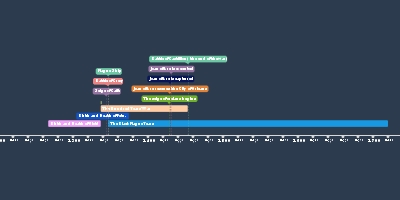The Boxer Rebellion (2 Nov 1899 Jahr – 7 Sept 1901 Jahr)
Beschreibung:
The Boxer Rebellion was an anti-imperialist, anti-foreign, and anti-Christian uprising in China between 1899 and 1901, towards the end of the Qing dynasty. It was initiated by the Militia United in Righteousness known as Boxers because many of their members had practiced Chinese martial arts, also referred to in the Western world at the time as Chinese Boxing. Villagers in North China had been building resentment against Christian missionaries. The immediate background of the uprising included severe drought and disruption by the growth of foreign spheres of influence after the Sino-Japanese War of 1895. After several months of growing violence and murder in Shandong and the North China Plain against foreign and Christian presence in June 1900, Boxer fighters convinced they were invulnerable to foreign weapons, converged on Beijing with the slogan "Support the Qing government and exterminate the foreigners." Foreigners and Chinese Christians sought refuge in the Legation Quarter. In response to reports of an invasion by the Eight-Nation Alliance of American, Austro-Hungarian, British, French, German, Italian, Japanese, and Russian troops to lift the siege, the initially hesitant Empress Dowager Cixi supported the Boxers and on June 21 issued an Imperial Decree declaring war on the foreign powers. Diplomats, foreign civilians, and soldiers as well as Chinese Christians in the Legation Quarter were besieged for 55 days by the Imperial Army of China and the Boxers. Chinese officialdom was split between those supporting the Boxers and those favoring conciliation, led by Prince Qing. The supreme commander of the Chinese forces, the Manchu General Ronglu (Junglu), later claimed he acted to protect the foreigners.2 November 1899 – 7 September 1901
Zugefügt zum Band der Zeit:
Datum:
2 Nov 1899 Jahr
7 Sept 1901 Jahr
~ 1 years and 10 months
